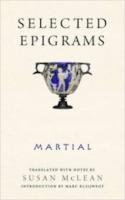
Wisconsin (2014) p/b 189pp £23.95 (ISBN 9780299301743)
Susan McLean is a poet, and it shows. This selection of about 500 epigrams (but not drawing on De Spectaculis, Apophoreta, or Xenia) displays a deftness and wit that frequently comes close to the original. M.’s professed aim—‘I have tried to remain as close as possible to the length and number of lines of Martial’s epigrams and to avoid omitting or adding material to the poems’—is carried through pretty consistently, and she often hits the spot in a very satisfactory way. Try 1.57:
Qualem, Flacce, velim quaeris nolimve puellam?
nolo nimis facilem difficilemque nimis.
illud quod medium est atque inter utrumque probamus:
nec volo quod cruciat nec volo quod satiat.
‘Flaccus, you ask what kind of girl I want?
One not too hard to get, but not too easy.
I like a girl between the two extremes:
One who will neither satiate not tease me.’
And 3.12:
Unguentum, fateor, bonum dedisti
convivis here, sed nihil scidisti;
res salsa est bene olere et esurire.
qui non cenat et unguitur, Fabulle,
hic vere mihi mortuus videtur
‘You gave your guests good scent last night,
I grant you, but no food was carved.
How droll, to be perfumed and starved!
To be anointed and not fed
is fine, Fabullus—for the dead.’
This is good: rhyme is the best way in English to achieve epigrammatic tightness, and M. even manages to reflect the different rhythms of elegiac couplet and hendecasyllable.
Many readers who are familiar with the poet’s seamier side (Byron, disingenuously, ‘And then what proper person could be partial / To all those nauseous Epigrams of Martial?’) will naturally look with interest to find out what M. makes of the many poems that mention bodily functions of various kinds. Here changing attitudes to rude words in print have undoubtedly helped the translator. Walter Ker in the 1919 Loeb, doubtless drawing on his knowledge of a specialized vocabulary, translated poems he described as ‘indescribably foul’ into modern Italian. By 1993 Shackleton Bailey felt able to, or enjoyed (?), rendering Martial’s everyday words into their English equivalent. Martial is notoriously unbuttoned about describing the more common sex acts in order to make a witty point at his enemies’ expense, and M. (who acknowledges being helped by Shackleton Bailey’s literal Loeb versions) seems to relish the challenge of remaining faithful to her original—though she is of course greatly helped by the fact that most modern readers are unlikely to be greatly shocked by a liberal sprinkling of c – and f – words.
Here is Martial making fun at his own expense (11.19)
Quaeris cur nolim te ducere Galla? diserta es.
saepe soloecismum mentula nostra facit.
‘Why won’t I wed you, Galla? You’re well-read.
my cock makes frequent grammar slips in bed.’
M.’s translations are prefaced by a long and rather wearisome historical essay by Marc Kleijwegt, for the poems stand very well by themselves, there is a useful bibliography, and explanatory notes by M. on nearly all the poems; even with her well-turned versions, the jokes often need explaining.
This is an excellent introduction to an often neglected writer. Non-classical aficionados of the Roman world will love it, for its cleverness and also for the light it throws on society under the early Empire.
Anthony Verity
